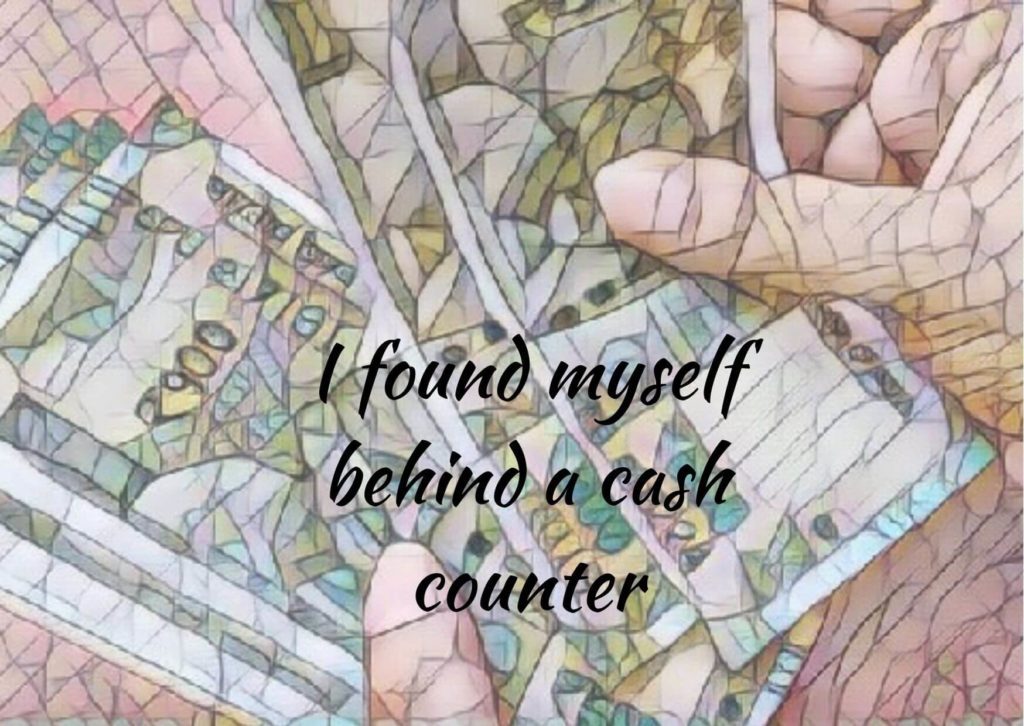Sujata’s story deals with the complexities of relationship in a household. A Special Feature, exclusively for Different Truths.
What are you thinking about Rita? Are you sad? Are you worried or are you just lost in thoughts? You stand under the flickering, fluorescent lamp in the terrace of your double-storied house like an angel without wings. The powder blue nightgown outlines your firm and soft symmetry conspicuously like that of a mannequin. Are you thinking about your husband, who had gone away to Singapore, or are you thinking about the fourth stillborn child you had delivered in the fifth year of your marriage? Just think of it, if your husband had not ventured his way to promising new lands looking for wealth you wouldn’t have been standing on the spacious terrace of this palatial house. When you skip on the dew-washed grass in your garden, when you go chasing the dragon flies out of your rose beds, I know your husband isn’t there to hold your hand. Nor is he there to share the four-course lunch so fastidiously prepared by the army of attendants fawning around you.
Your husband’s loving arms must be reaching out to you through them.
You tend your garden, you scold your servants, you flip through the shabby leaves of the paperback novels – dropped at home by the library on wheels – you fret and fume, sigh and moan away your mornings and evenings. I know all this. But what about those long blue envelopes, the postman brings you every week? Your husband’s loving arms must be reaching out to you through them. Doesn’t he croon to you all those sweet nothings, you long to hear. Or has he stopped sending you letters? You are surprised. How do I know so much about you?
Pigeonhole Window
Sitting by the casement, the pigeonhole window, at the south wing of my wife’s tharavade, family house, stealthily I have been watching you, day after day — at dawn when sparrows flap their wings on the wooden shutters and rouse me from my sleepless nights, when the night wind drums against the rusted iron bars and laughing at my lot flies back into the night. My wife never came to know about my antics. Or else she would have closed the shutters forever. She might have even pulled down the window and plastered the wall.
1 know, Rita, you couldn’t have seen me. For, like a thief, I sat inthe dark, hiding myself in my own house, no, in the tharavade of my wife, with unkempt beard and unruly hair. But I kept looking at you, day after day, night after night, and my wife knew nothing about it.
Pious and God-fearing
My wife, Rama’s and Uma’s mother is pious and god-fearing. She lights the lamp every evening on the tulsi shrine and sits on the veranda with her daughters and together, they chant shlokas— Vishnu sthuti and Siva sthuti. The stereo music, which comes bellowing from your double—storeyed house, I know, infuriates her. What does she know about lilting rock or classy jazz? Heathen, crazy, indecent, she brainwashes her impressionable daughters. The ewe lambs would bolt out of the ropes, very soon. I am waiting for the day.
The other day I saw her huddled in a corner, lost in Dostoevsky. She broods over crime and punishment.
Rama, the eldest would be the first to do so. The other day I saw her huddled in a corner, lost in Dostoevsky. She broods over crime and punishment. The moisture I see in her eyes, whenever she looks at me (oh! My dear daughter!) falls on me like a balm more soothing than the cool mixture of herbs and clay which she used to massage on to my scalp, so kindly, those early days of my depression. She could come to me then- I was only a depressed man, not yet branded, Rama is like me, or I am like Rama. I love books, like her. She loves books like me- But now I read only these huge ledgers and files. I count, add, subtract, divide and multiply and check the entries. I cannot afford to make another mistake. My father thought I was crazy to think I could make my living by writing. Whenever I sat on the highest branch of the mango tree, greedily reading my books, my brothers used to throw stones at me. They said they were trying to get at the green mangoes and mother never punished them.

Powerful Guys
When I failed to get entry into an engineering college, my father decided I should enter a bank. Even that was not very easy. He knew some powerful guys. So, I found myself behind a cash counter, counting and doling out crisp and crumpled, used, and abused, stained, and sullied currency notes. How did that big discrepancy come about? I am sure it was not my mistake. I worked very hard, and I was very careful, those days. My job had brought me respect and recognition. In my house I was a ‘someone’ now. My father was happy, I bought for him blankets and his favourite brand of cigarettes.
My wife gave me dewy looks whenever I brought for her a new sari.
My wife gave me dewy looks whenever I brought for her a new sari. My children came running to the door and clung to me, every first day of the month when I carried in for them a bag full of toys. The power and glory of money; I relished every bit of it. I was pleased with my own self- And I wished things to stay that way. So, I was punctual at work, extra cautious and hard working. I had a clear bright vision of my future. I had to build a house for my wife; I had to get my daughters married. How could I have been careless when I was gearing myself for promotions? I am sure, I had not made any miscalculations. I know it was my best friend who had done the mischief. I remember very well, he had relieved me at the counter for twenty minutes, that day. Those twenty minutes had mauled me for life. Of course, he denied it when questioned in the court. I was a small man I carried my innocence mutely like a cross. My father paid a huge sum to save me. He couldn’t survive the shock. So many fingers pointing at me! My brothers and sisters shunned me. My wife glared at me accusingly. I crept to my corner, in the south wing of my wife’s tharavade and read and reread, checked, and rechecked the huge ledgers.
Bank Records
Those silly notebooks, he tells me they are the bank records – I heard my wife telling her darling brother and they laughed. But these are really the bank ledgers. How can I convince them? They think I have gone mad. When I snap at the flies and sweep the spider and cockroach away from my corner even the maids laugh at me. Uma my younger daughter looks at me in fear. I haven’t harmed any one of them; 1 will not harm any one of them. Still, they keep away from me. I am a branded man. I am a man who has lost his job; I am a man who has lost his mind. Only Rama perhaps understands, how I feel Rama is like me or I am like Rama. A victim, an outsider, I sit here in this corner, in the south wing of my wife’s tharavade. silently counting, minutes, hours, months, and years. And I stealthily look at you, Rita, through this pigeonhole window. My wife knows nothing about it. Or else she would pull down the window and plaster the wall.
My wife is smart, efficient; she runs the house like a queen.
My wife is smart, efficient; she runs the house like a queen. She counts coconuts, separates a few, dries them in the sun, sends them to the mill for fresh oil. She measures the paddy, stores the rice, and rules the servants with an iron hand. Friends and relatives are all praise for her. And they click their tongue and condole the life in death of her criminal, ineffectual husband. They marvel at her patience and generosity. She will be blessed even in her next janma, for carrying this burden — that is me. How many women would have tolerated such a man, with an unruly beard and unkempt hair, snapping at flies, peering through ledgers, even though he sits silently in a dark corner, in the unused wing of this sprawling house?
Rita, let me ask you again, what are you thinking about? Those long blue envelopes, are they not regular any longer? Or instead of bringing you comfort; they now bring nightmares to you? You fear, your husband had moved far away from you? You are alarmed; he had found another woman who would give him his heir apparent? Your heart bleeds when you think of the four stillborn babes, you had borne for him. You wish to plead with him to give you a chance a fifth time. But you know, you wish in vain. It is a hopeless situation.
Neighbour’s Children
I have seen you playing with your neighbour’s children. From the hutment across the road, you bring the half-naked, starving children, bathe them and dress them in new clothes. You make them sit on your lap and feed them. How many times I have watched you, hugging them, holding them to your heart. You have a mother’s heart. What if the babes from your womb have not survived? Open your heart, a mother’s heart, to the children of the world. Be kind to diem, be kind to me. Hold me in your arms as you hold those babes and wipe my tears. Be kind to a man who sits curled in a corner like a bundle of soiled clothes.
The man who stands behind the bars of this casement, with unruly hair and unshaven beard — is he a mad man?
The man who stands behind the bars of this casement, with unruly hair and unshaven beard — is he a mad man? You who stand on the terrace of your double-storied house, grieving for your stillborn babes are you an accursed soul? Your mansion where- in the absence of your husband — men, young, middle-aged, and old come and go, at all odd hours, is it an entertainment house? My wife, Rama’s and Uma’s mother says so and thinks so. Her contempt for you only makes me more concerned for you. Jesus shielded Mary Magdalene from those who stoned her. Who would save you from my wife and all those who think like my wife?
Don’t be Sad
Rita don’t be sad. You mean a lot to me. You are my mother, you are my sister, you are my sweetheart, and you are all that and much more to me. You comfort me, I will comfort you. I will keep the pigeonhole window of the south wing of my wife’s tharavade open for you. Will you come unobtrusively, in the night, without letting my wife know?Let us go together into the night; let us get lost in darkness. How about it? Will you come?
Stories hum within my head. I see stories spinning all around me. Which is your story? Which is mine? Is their story different from ours?
Visual by Different Truths





 By
By
 By
By
 By
By
 By
By